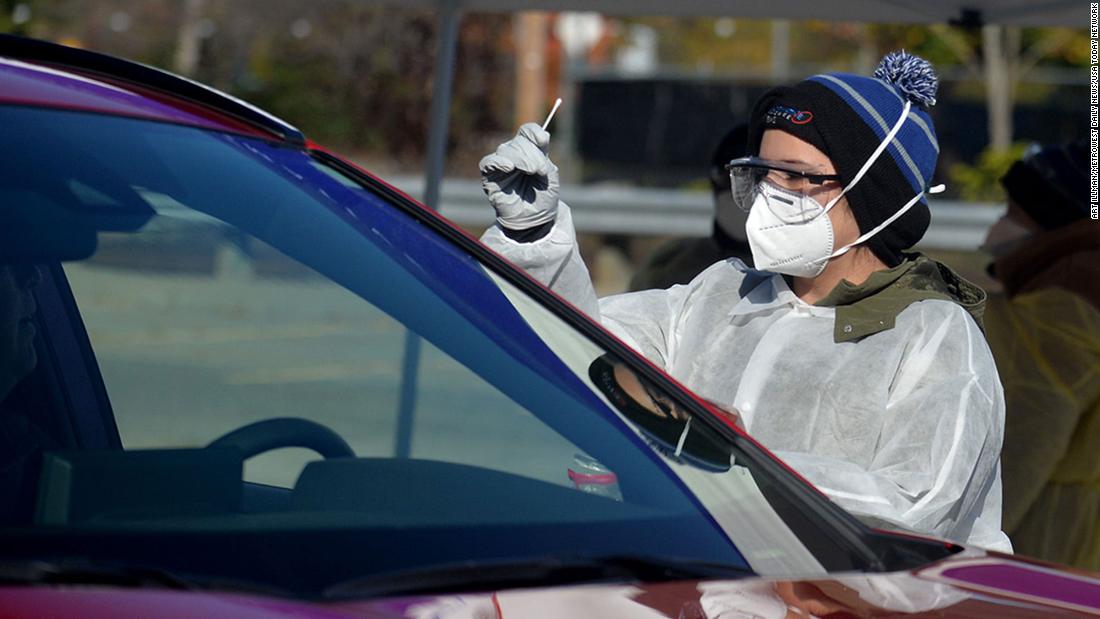(Trends Wide) — Covid-19 case, hospitalization and death rates have dropped significantly in the United States since the surge fueled by the highly contagious delta variant peaked in September.
However, with cases still relatively high, many children still unable to be vaccinated, and colder weather looming, this is not the time to feel comfortable about the country’s position, leading health experts have said.
“We are now heading in the right direction … but as cases remain high, we must remain vigilant in the face of the coldest and driest months of winter,” said Dr. Rochelle Walensky, director of the Centers for Disease Control and Prevention (CDC), at a coronavirus briefing at the White House.
Cases, hospitalizations and deaths skyrocketed after the start of the boreal summer, when the delta variant became dominant, but all three are declining now.
According to data from Johns Hopkins University, in the last week an average of 69,011 new cases have been registered per day, which represents a decrease of 60% with respect to the peak of the wave driven by the delta variant (127,531) reached at mid September.
The median is also well below the country’s all-time peak, which was more than 251,800 daily cases in mid-January, amid a winter surge when deployment of the vaccine was new and limited.
The current declines and the months of vaccination have raised speculation about whether the country is past the worst of the virus prevalence.
Former Food and Drug Administration (FDA) commissioner Dr. Scott Gottlieb previously said that the surge fueled by the delta variant of the coronavirus could be the last major wave of infection, thanks in part to the vaccines, unless there is a new variant that transcends the immunity of the vaccination and the previous infection.
Gottlieb insists that he is not saying that the numbers will not rise again, but that they may not rise as much as during the delta surge if a dangerous new variant does not emerge. He stated that the virus could establish itself in a more seasonal pattern, including increases in winter, because colder and drier air could favor the spread of the virus.
Even Gottlieb, a member of Pfizer’s board of directors, said vaccination rates should be higher, perhaps as much as 80-85% in adults, to reliably prevent another wave of the delta variant. Currently, about 69% of American adults are fully vaccinated, according to the CDC.
Other experts have been more cautious about whether the US has recorded its biggest surge.
Explaining Wednesday why elementary schools should not challenge the CDC’s recommendation that face masks be worn by everyone who attends in person, regardless of their vaccination status, a medical school official pointed out what happened when the country in general he relaxed his attitudes towards face masks.
“We saw this happen in June, over the summer, when we declared that the pandemic was over a little early,” Dr. Richina Bicette-McCain, associate medical director of Baylor College of Medicine, told Trends Wide on Wednesday.
“We decided that vaccinated people didn’t have to wear a mask, which resulted in everyone stopping wearing a mask, and then the delta surge and surge occurred,” Bicette-McCain said.
Regarding hospitalizations: the number of patients with covid-19 in US hospitals, 51,541 as of this Wednesday, has fallen by 50.4% since the delta peak reached in September, according to the Department of Health and Human Services (HHS).
According to Johns Hopkins University, there were an average of 1,369 deaths a day from covid-19 last week. This figure has generally declined since the delta surge peaked at 2,092 on September 22.
Most parents don’t plan to vaccinate young children right away, survey finds
Even with COVID-19 case rates declining, children should be vaccinated as soon as they are eligible, Dr. Anthony Fauci said Wednesday.
“All you have to do is go to pediatric hospitals throughout the country and see, especially with the delta variant, which has a much higher chance of being transmitted, that there are more children who are infected,” said Fauci, director of the Institute. National Allergy and Infectious Diseases, to Trends Wide.
Vaccine eligibility could soon be extended to ages 5 to 11. An FDA advisory panel voted last week to recommend emergency use authorization for the Pfizer-BioNTech covid-19 vaccine for that age group.
The FDA is expected to decide soon whether to accept that recommendation, and CDC’s vaccine advisers will meet next week to discuss whether the agency should recommend the vaccine for those ages.
However, many parents have said they will not immediately vaccinate their younger children, according to a survey released Thursday by the Kaiser Family Foundation.
Among parents of children ages 5 to 11, only 27% said they would vaccinate their children against the virus as soon as the vaccine became available.
That number has stayed about the same since July, despite growing evidence that Pfizer’s vaccine is safe and effective for these younger children. The vaccine is already licensed for children and adolescents 12 years of age and older.
Another 33% said they would wait to see how the vaccine works before vaccinating their children ages 5 to 11, according to Kaiser. The group surveyed more than 1,500 American adults from October 14 to 24.
About 76% of those surveyed said they were “very” or “somewhat” concerned about long-term side effects, while 71% were concerned about serious side effects.
Dr. Peter Hotez, co-director of the Texas Children’s Hospital Center for Vaccine Development, said a vaccine is needed for children ages 5 to 11, because COVID-19 is a “very bad actor” even with these. younger children.
Hotez said scientists will have to keep a close eye on any rare security issues. A very small number of cases of heart inflammation, such as myocarditis, have been reported among older children who received the COVID-19 vaccine. Pfizer said it hasn’t observed any safety concerns in younger children, but its trials involved only about 2,000 children and it may not be a large enough group to detect the rare case of vaccine-related heart muscle inflammation. .
The rate of covid-19 myocarditis is “much higher,” Hotez said, posing a much higher risk.
Survey: 43% say they have returned to pre-pandemic activities
With the delta variant surge waning, many Americans claim to have largely returned to their pre-pandemic activities.
About 43% of those surveyed said they had basically returned to normal pre-pandemic behaviors, according to the Kaiser Family Foundation survey released Thursday.
About 6% said they never changed their activity level, and another 35% said they went back to “doing some, but not all” pre-pandemic activities, the foundation said.
Fauci has previously said that case rates should drop to about 10,000 a day before lifting the restrictions. On Wednesday he told Trends Wide that it was too early to abandon the use of masks in schools, in particular.
“The dynamics of the infection right now, we’re still averaging about 70,000 infections a day. That’s too high a viral dynamic to say, ‘Okay, we’re fine; we don’t need to do any more mitigation,'” he told Trends Wide on Wednesday. director of the National Institute of Allergies and Infectious Diseases.
Fauci said the country will come to a point when it can stop wearing masks.
“But I don’t think we’re ready for that right now, especially when it’s in a closed space,” Fauci said.
Trends Wide’s Jen Christensen contributed to this report.


:max_bytes(150000):strip_icc():focal(787x244:789x246)/John-Goodmans-LA-Home-burned-010925-tout-42cc53fa164044e689402264b67a9494.jpg)

